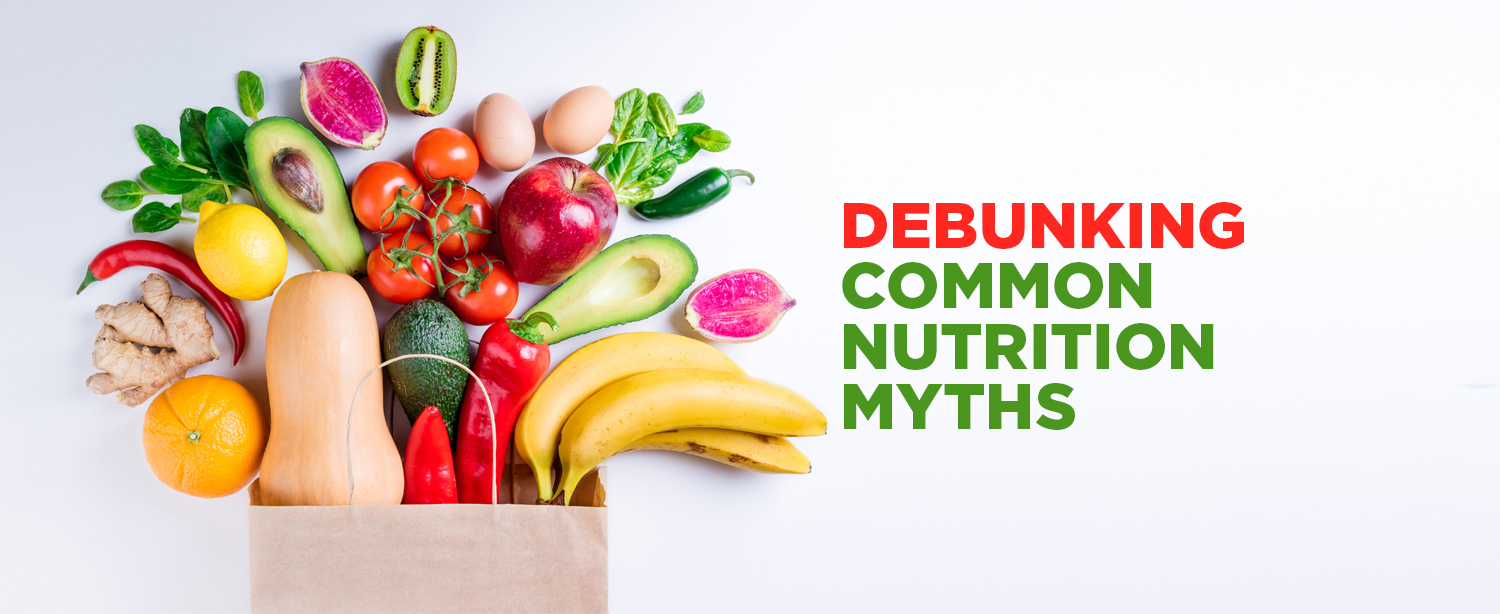Do you eat healthy every day? Or is your diet influenced by social media? Do you often get carried away by fad diets and trends? Nutrition can be a debatable subject for many people, often fuelled by opinions from unqualified and self-proclaimed health experts. Nutrition is simple if understood well and from the right sources. Whatever diet regime you follow, the conclusion is that you should eat a whole, minimally processed diet high in vegetables, fruits, whole grains, beans, legumes, nuts, seeds, and water. You can’t go wrong if you can do that. We dispel some of the most common myths to help you start eating better right away.
Common nutrition myths
Here are some of the most common myths and facts to understand before making healthy dietary choices:
Myth: Fats are bad for you.
Fact: Stop being afraid of foods containing fats. Fats are essential for your body’s energy levels, maintaining cell membranes, promoting growth and development, vitamin absorption, heart and brain health, and many other functions. Choose unsaturated fats that are good for your heart, like olive and canola oil, nuts, and avocados, over saturated and trans fats, like fatty meats and high-fat dairy products.
Myth: A detox diet helps clean toxins.
Fact: There is little evidence that your body requires regular dietary cleanses. Your liver, kidneys and gastrointestinal tract do a great job detoxifying your body. Simply focus on eating well and staying hydrated.
Myth: You must avoid Carbohydrates.
Fact: Carbohydrates are your body’s primary source of energy and are classified as simple or complex. Simple carbs are found in foods that are not generally nutritious such as chips, packaged juices, soda, candy, and other sweets. Complex carbohydrates are more nutrient-dense and can be found in more nutritious foods such as fruits, vegetables, whole grains, beans and nuts. Make the best carbohydrate choice.
Myth: Gluten-free foods are better.
Fact: Gluten-free foods are not healthier for you if you do not have celiac disease or a gluten sensitivity. A gluten-free diet is not intended to help people lose weight; rather, it is intended to help people with these conditions.
Myth: Salt is unhealthy.
Fact: Excess sodium consumption can cause high blood pressure and kidney damage, but salt (sodium) is a mineral that is required for many bodily functions. Sodium is an important electrolyte that aids in water balance and is required for the proper functioning of our muscles and nerves, including our heart and brain. Limit your salt intake but don’t skip it entirely.
Myth: Dietary supplements are a must.
Fact: Rather than taking supplements to get the vitamins, minerals, and nutrients you must eat a variety of healthy, nutrient-dense foods such as vegetables, fruits, whole grains, and lean proteins. Dietary supplements should only be taken on the advice of a doctor if a deficiency is discovered that cannot be corrected through diet alone.
Myth: Weight-loss products labeled as “natural” are safe.
Fact: These products are not guaranteed to be safe or effective. Before attempting a natural or herbal remedy, consult your doctor because these claims are not always supported by science and research. Remember, there is no “quick fix” for losing weight.
Myth: Snacking is unhealthy.
Fact: Snacking alleviates hunger and can work in your favour or against you depending on what you eat and when you eat it. It is recommended to choose apples, nuts, bananas, carrots, hummus, and curd dip as nutritious snacks. Avoid having processed and packaged foods as your snacks.
Myth: A glass of red wine is heart healthy.
Fact: Most people would not benefit from having a glass of wine every night. There is no reason to start drinking in order to protect your heart. Instead follow healthy heart lifestyles to reduce your risk of cardiac diseases.
Myth: Nuts will cause weight gain
Fact: This is not true. Nuts are not only high in fat and calories, but they are also high in protein, fibre, vitamins, and minerals. Limit yourself to a handful of assorted nuts per day.
Hope we have clarified most of your nutrition related myths. Are you still wondering what to eat and what not to eat? If you are looking at a personalized diet plan, consult nutritionists at our Department of Nutrition Therapy for a healthier and sustainable plan.


